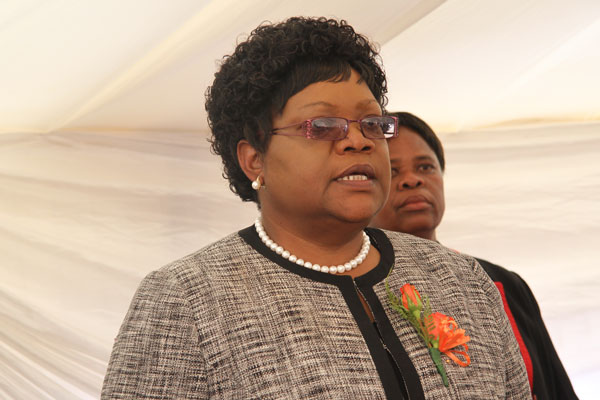
PRESIDENT Robert Mugabe’s ruling Zanu PF party yesterday appeared shaken to its core after former Vice-President Joice Mujuru unveiled her People First party manifesto, setting the stage for a bruising fight in the 2018 elections.
By RICHARD CHIDZA
The move by Mujuru on Monday caused Mugabe’s handlers to quake in their boots before they later put on a brave face and dismissed the PF blueprint as “weak and wishy-washy”.

Yesterday, political analysts said Zanu PF top officials’ utterances betrayed the panic in the ruling party, adding Mujuru’s document greatly undermined Mugabe’s 10-point plan presented to Parliament as the panacea to the country’s problems recently.
Zanu PF political commissar Saviour Kasukuwere was the first to dismiss Mujuru’s manifesto.
“That is a weak (document). It is meaningless with nothing to show for a serious politician. It will be ‘FTT’ — failure to thrive. Hapana deal apa (It’s useless). You can’t even think of it as a manifesto or anything . . . It’s wishy-washy,” he told NewsDay.
Kasukuwere, who later addressed party supporters in Marondera, poked fun at Mujuru’s PF project.
- Chamisa under fire over US$120K donation
- Mavhunga puts DeMbare into Chibuku quarterfinals
- Pension funds bet on Cabora Bassa oilfields
- Councils defy govt fire tender directive
Keep Reading
“This is the real Zanu PF, not these other parties. Don’t waste time following ‘People Lost’. They left and that is it. Those who think that President Mugabe’s party is not good, they are free to march out. We remain strong,” he said.
Not to be outdone, Higher and Tertiary Education minister Jonathan Moyo took to Twitter, rubbishing the former Vice-President’s document and describing it as “treacherous”.
“Gamatox (derisive name for Mujuru’s faction during her time in Zanu PF) has stolen a failed MDC-T manifesto with indigenisation and land reform as the targets! Gamatox is poison, not a manifesto!” Moyo said.
He characterised the manifesto as “treachery” when one of his followers suggested that the document could be a wake-up call for him and other Zanu PF members to up their political game.
“Zanu PF will never produce such an anti-Zimbabwe and treacherous document against land reform and indigenisation! You mean LOOTASSET is better than ZimAsset (Zimbabwe Agenda for Sustainable Socio-Economic Transformation)!” Moyo quipped.
But PF spokesperson Rugare Gumbo remained cool.
“Let them huff and puff, we will respond at an appropriate time when they have exhausted their malice. We welcome criticism and that is what separates us from other movements. We are an inclusive movement, but will respond to direct attacks at the right time,” Gumbo said.
The main opposition MDC-T also seemed to have been caught flat-footed, with party spokesperson Obert Gutu tersely saying: “We are still studying the manifesto and in the fullness of time, we will be providing our detailed response thereto.
“However, as the MDC, we are happy with any initiatives that are geared at sustainably and holistically extricating Zimbabwe from the socio-economic hellhole that has been created through decades of Zanu PF misrule and unmitigated corruption.”
Academic and political analyst Ibbo Mandaza said Moyo’s utterances pointed to alarm in the ruling party.
“Such rushed comments betray the panic in Zanu PF. They do not know what hit them and particularly for Moyo, he is a frustrated man who finds himself unable to reply officially hence resorts to Twitter,” Mandaza said.
“It undermines and directly answers to Mugabe’s 10-Point Plan. The document is straightforward and emphasises on the things that Zanu PF has been dragging its feet on. The issue of property, human and social rights — these are issues that have prevented investment flowing into the country. And these things are known in Zanu PF. The likes of (Vice-President Emmerson) Mnangagwa have been saying these things subtly, but are afraid to bite the bullet.”
Political analyst Pedzisai Ruhanya said Mujuru had set the cat among the pigeons and the clarity with which she had articulated her vision was probably what Zimbabweans have been yearning for.
“Mujuru has provided leadership, both political and economic, and her domestic and foreign policy are a breath of fresh air. She has ideological clarity. Unlike Zanu PF, Mujuru does not speak in tongues.
“She wants a democratic developmental State in which the State has little to do with how markets operate. Zanu PF preaches socialism by day, but engage in Stone-Age and criminal accumulation of wealth in a sea of national poverty, like the likes of (First Lady) Grace Mugabe and others,” Ruhanya said.
“It is a sound document, a practical and persuasive manifesto, particularly in a situation where the State has failed to address the socio-economic problems facing the country. If it is not a forged document, then we are in for interesting times politically.”
University of Zimbabwe political science lecturer Eldred Masunungure said Mujuru still enjoyed significant support among ordinary Zanu PF members, senior party officials and the military establishment.
“Let’s not assume that it will be plain sailing for her. She will be subjected to the usual restrictions and repression as has been the familiar trademark against those who oppose Zanu PF,” Masunungure told online news agencies yesterday.
In her document titled Blueprint to Unlock Investment and Leverage for Development (Build), Mujuru said under her stewardship, she would run a lean government which respects property, land, human and socio-economic rights.
Mujuru, who was forced out of Zanu PF and the government late last year, said her administration would compensate victims of compulsory land acquisition as well as give millions of Zimbabweans in the Diaspora the right to vote.
She also pledged to repeal a host of anti-democratic pieces of legislation, among them the Indigenisation and Economic Empowerment Act, the Public Order and Security Act as well as the Access to Information and Protection of Privacy Act.











